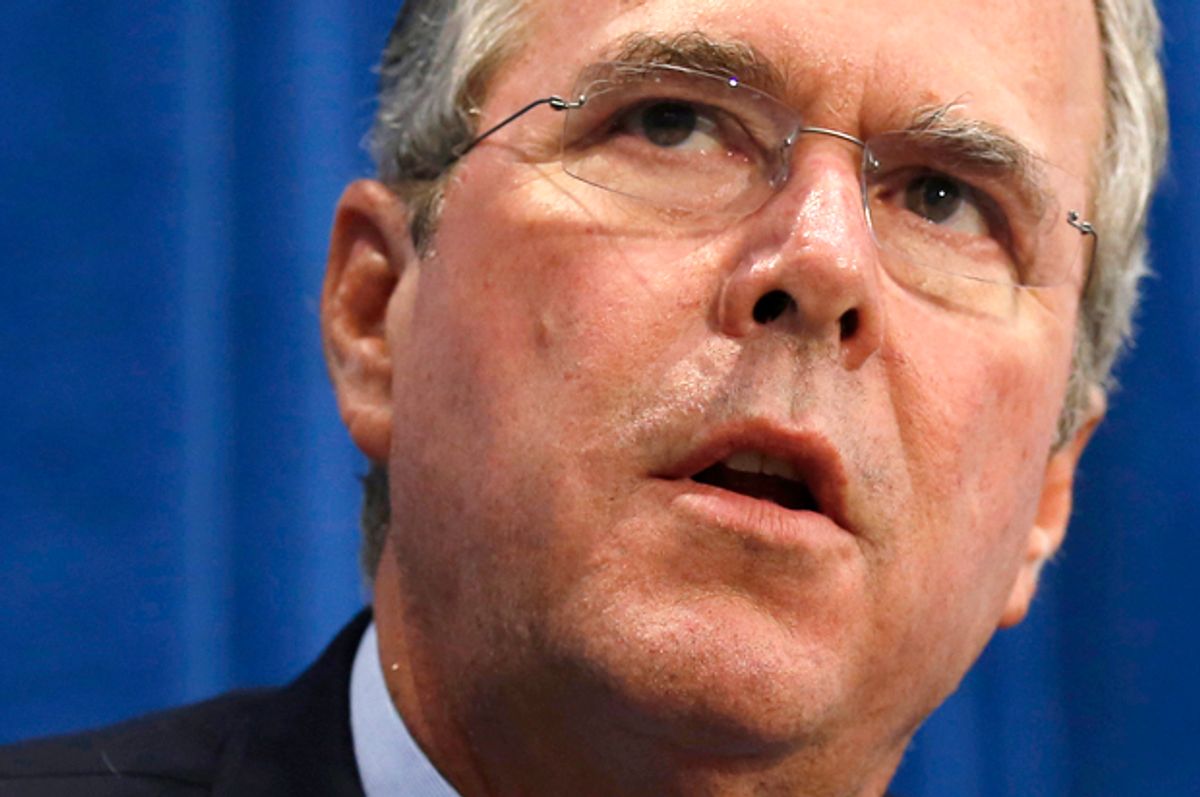Jeb Bush is going to unveil his tax plan later today and, based on some early indicators, it looks like he’s cooked up a pretty sweet deal for America’s wealthiest taxpayers. According to the Washington Post, Jeb spent an hour yesterday meeting with some of the high priests of the supply-side economics movement – Stephen Moore, Steve Forbes and Larry Kudlow – to get their advice on how to use tax policy to excite the Republican base. Kudlow apparently got a preview of Jeb’s proposal and happily declared it “pro-growth,” which we can confidently interpret to mean “cuts taxes for rich people.”
That’s not really too surprising. Jeb is, after all, a Republican, and Republicans prize tax cuts for wealthy people as the highest policy aim to which one can aspire. He boasts on the trail of the billions of dollars of tax cuts he approved while governor of Florida, the lion’s share of which went to the state’s wealthiest residents. One of the big questions is how radical he’ll get with his proposed cuts. Other candidates in the 2016 Republican primary have put together some scandalously large tax cuts for the 1 percent, and Jeb may feel the need to keep pace – if not to appeal to conservative base voters, then at least to prevent his establishment backers from being lured away by Marco Rubio’s zero-percent capital gains rate.
Another big question is how Jeb will sell these tax cuts. Republican policymaking when it comes to taxes typically involves crafting some huge giveaway for the rich and then wrapping it in layers of bullshit messaging to convince people that lavishing money on the wealthy through the tax code will actually help out the common man. We got a small taste of that the other day when Rubio was asked to explain how eliminating taxes on capital gains squares with his personal identification with “working class” families. It makes sense, Rubio argued, because wealthy people create jobs like the one his father had tending bar at a hotel.
But I’m especially eager to see how Jeb will package his tax cuts given that he was, at least for a brief moment earlier this year, a Republican voice of concern on income inequality. Republican presidential candidates have been frustrated to a certain extent by the fact that the economy is not the cratering disaster they’d predicted would happen under Barack Obama, and so they’ve had to get a bit creative in their economic messaging. For Jeb, this meant pointing out the “opportunity gap” and focusing on stagnant wage growth. “If you're born poor today, you're more likely to stay poor,” he said in an April speech. “We need to deal with this.” Jeb’s political action committee, Right to Rise, launched in January with a mission statement that, at first glance, seems like an endorsement of class warfare: “While the last eight years have been pretty good ones for top earners, they’ve been a lost decade for the rest of America.”
Rhetoric aside, Jeb is a terrible messenger when it comes to income inequality. As National Journal reported earlier this year, Jeb’s economic policy as governor focused explicitly on cutting taxes that disproportionately affected the wealthiest Floridians. During Jeb’s two terms in office, Florida “saw the sixth-highest growth in income inequality of any state.” His policies were in keeping with the general worldview of the supply-siders Jeb was pitching his tax plan to yesterday: shower the wealthy with tax cuts and assume it will lead to shared growth and prosperity. As you might imagine, “giving rich people lots of money” is a terrible way to address inequality.
But no Republican is going to come right out and boast about how much money the 1 percent will save under their tax plan. They’ll find other aspects to highlight that are more politically palatable. According to the Post, Jeb is going to propose “lower corporate and personal tax rates while also eliminating a number of deductions that favor Wall Street investors.” The elimination of deductions is supposed to give his plan a bit of populist flavor to compete with Donald Trump, who has lashed out at “hedge fund guys” who exploit loopholes to escape taxation. And as the Post’s Robert Costa points out, while Jeb pitches the “pro-growth” rate cuts to Stephen Moore and Larry Kudlow, he favors the “cutting deductions” part of the plan when he discusses it on the campaign trail:
[embedtweet id=641289324881932288]
After so many weeks of trailing Trump in the polls, Bush is looking to get a political boost out of this tax plan and regain some control over the direction of the primary. It’ll be interesting to see if Jeb, as part of his strategy to poach some of Trump’s populist appeal, has the nerve to recast himself as an enemy of inequality.

Shares